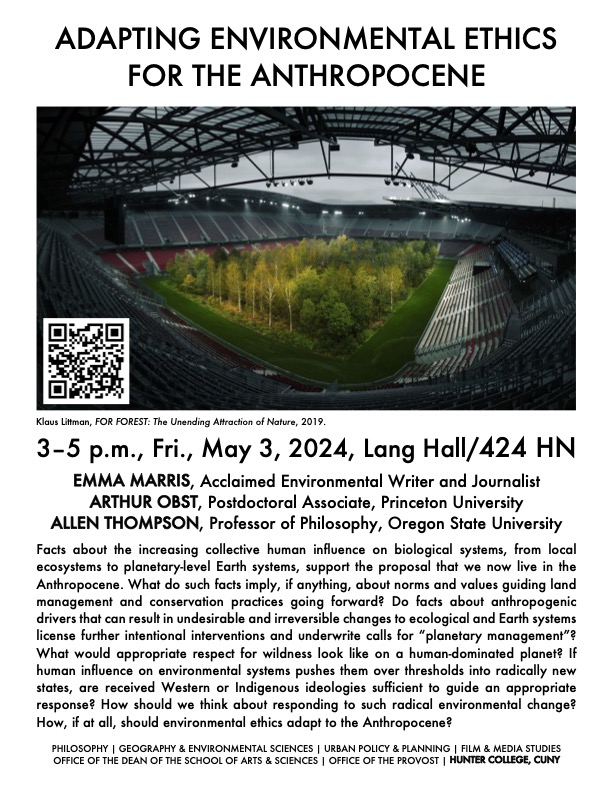Søren Kierkegaard’s most famous work, Fear and Trembling, has the distinction of drawing near-universal derision from scholars of political theory and ethics. Dr. Dinan suggests that Kierkegaard’s readers haven’t accounted for his return to Socratic political philosophy as a direct riposte to the politics of G.W.F. Hegel and his successors. He considers the implications of Kierkegaard’s use of the ‘questionable stratagem’ of Socratic irony in relation to politics, ethics, Christian faith, and philosophy. Kierkegaard is concerned not with destroying political philosophy, but with restoring its attentiveness to paradox.
Dr. Matt Dinan, Assistant Professor, St. Thomas University
Efforts to diversify philosophy, at the curricular level, often focus on increasing the content covered in a semester: i.e., making room for more women on the syllabus, making room for more non-Western texts and thinkers, etc. Similarly, efforts to diversify philosophy, at the professional level, often focus on making room for marginalized topics and/or members of under-represented groups at conferences, in anthologies, and among faculty (both in terms of demographics and research specializations). This all serves to create an antagonistic situation where marginalized voices must fight to be heard and those in the discipline must make “tough choices” about where to cede precious resources such as syllabus space, publication credits, and faculty hires. I suggest that part of the antagonism, at least in the case of Asian philosophy, arises because we are trying to fit non-European texts and thinkers into disciplinary structures that are themselves designed to accommodate a Eurocentric model for philosophy. By “disciplinary structures” I mean the philosophical canon and historical narrative as well as departmental course offerings, curricular requirements for majors and minors, classroom pedagogical practices, and academic research methodologies. Truly transformative change must take place at the structural level. In this brief talk, I consider the scope of such changes, in concrete terms, and raise questions about the effects these changes would have on the disciplinary identity of philosophy as we know it today.
With a response from:
Andrew Lambert (College of Staten Island, CUNY)
Eva Bockenheimer. Frederica Gregoratto. Thimo Heisenberg. Axel Honneth. Rahel Jaeggi. Gal Katz. Frederick Neuhouser. Andreja Novakovic. Angelica Nuzzo. Johannes-Georg Schülein. Italo Testa.
April 22-23 Time TBA
*In-person event
Please join us for a talk by Eric-John Russell (Universität Potsdam), who will present chapters from his recently published book, Why Everything is as it Seems: Hegel and Debord. Jacob McNulty (University College London) will provide a response followed by a Q&A with our audience.
Guy Debord has been called many things: pseudo-philosopher, nihilist, filmmaker, megalomaniac, strategist, third-rate Mephistopheles. His book The Society of the Spectacle (1967) has fallen into a similarly motley reception, frequently enveloped within the discourses of postmodernism, media and cultural studies, and avant-garde art history. My research however, dispenses with such narratives and instead offers a sustained examination of the concept of the society of the spectacle through the two pillars upon which Debord understood his own work as a critical theory of society: Marx’s critique of political economy and Hegel’s speculative philosophy. It is the latter that will be the focus of my paper, first by offering some introductory remarks on Debord’s theory of the spectacle but then arguing that it precisely the speculative dimension of Hegel’s dialectic that remains central for Debord’s diagnosis of twentieth century capitalism, with emphasis placed on the importance of Hegel’s Wesenslogik. I will conclude with the historical significance of Debord’s “heretical Hegelianism,” specifically as an intervention within the atmosphere of the French Hegelianism of the interwar and postwar period.
15 Feb, 4pm:
James Kreines (Claremont McKenna)
From Shapeless Abyss Towards Self-Developing Thought: Taking Hegel on Spinoza Seriously
@ The New School, Room L502, at 2 W 13th Street
Guests and visitors policies at the New School can be accessed via this website. You will have to download CLEAR and upload proof of vaccination or the results of a rapid test. Please try to arrive 15 minutes earlier so we can help you in case of complications.
Feb 24:
Georg Spoo (Freiburg)
Grounds and Limits of Immanent Critique: Kant, Hegel, Marx
@ Columbia
Mar 3:
Heikki Ikaheimo
Hegel, Humanity, and Social Critique
@ Zoom
Mar 24:
Stephen Howard (KU Leuven)
Kant’s Late Philosophy of Nature: The Opus Postumum
@ Columbia
Apr 11:
Karin de Boer
Does Kant’s Antinomy of Pure Reason Amount to an A Priori History of Rational Cosmology?
@ Columbia
Apr 15, 4pm:
Eva von Redecker
Co-sponsored by the New School Graduate Student Conference
@ The New School
Apr 21:
Giulia Battistoni
NAture, Life, Organizm: The Legacy of Romanticism and Classical German Philosophy in Jonas’ Philosophical Biology
@ The New School
Facts about the increasing collective human influence on biological systems, from local ecosystems to planetary-level Earth systems, support the proposal that we now live in the Anthropocene. What do such facts imply, if anything, about norms and values guiding land management and conservation practices going forward? Do facts about anthropogenic drivers that can result in undesirable and irreversible changes to ecological and Earth systems license further intentional interventions and underwrite calls for “planetary management”? What would appropriate respect for wildness look like on a human-dominated planet? If human influence on environmental systems pushes them over thresholds into radically new states, are received Western or Indigenous ideologies sufficient to guide an appropriate response? How should we think about responding to such radical environmental change? How, if at all, should environmental ethics adapt to the Anthropocene?
